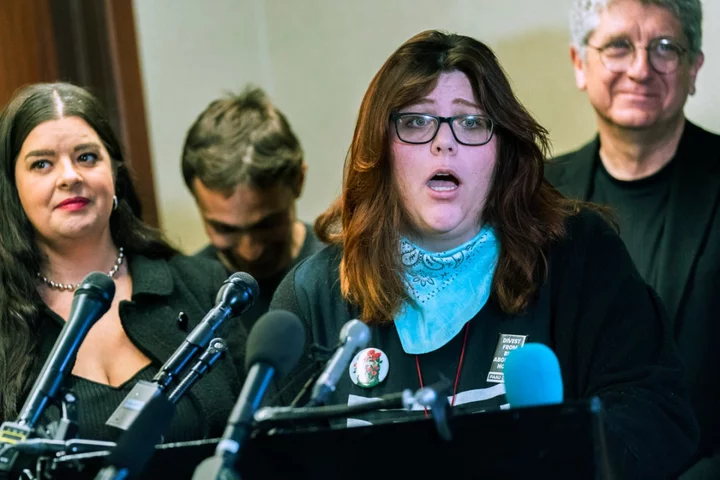
Anti-abortion activist who kept foetuses in her home is convicted of blocking access to clinic
Anti-abortion activist Lauren Handy was convicted of illegally blocking a reproductive health clinic in Washington, DC after she kept five foetuses in her home. Handy and five other defendants were accused of violating the Freedom of Access to Clinic Entrances Act (FACE Act) — which prohibits intimidation or obstruction of someone seeking reproductive health services — when they blocked access to the Washington Surgi-Clinic in October 2020 using chains and ropes, according to a Justice Department release. A US District Court jury in DC found Handy and four co-defendants —John Hinshaw, Heather Idoni, William Goodman, Herb Geraghty — guilty on all counts. Each defendant was convicted of a felony conspiracy against rights and a FACE Act offence, the release stated, specifying that each face up to a maximum of 11 years in prison and a fine of up to $350,000. The Washington Post noted that a second group of defendants involved in the same blockade have a trial that is set to begin next week. The Justice Department wrote that Handy, Hinshaw, Idoni, Goodman, and Geraghty engaged in the conspiracy when they came from all over the country to Washington, DC “to meet with Handy and participate in a clinic blockade that was directed by Handy and was broadcast on Facebook.” Prosecutors said that Handy called the clinic while under the guise of a prospective patient to book an appointment to figure out when the clinic performed abortions — in order to plan when she and others could arrive to stop patients from getting inside. The Justice Department wrote that Handy, Hinshaw, Idoni, and Goodman “forcefully entered the clinic and set about blockading two clinic doors using their bodies, furniture, chains and ropes.” That’s when they began livestreaming their blockade. In terms of violating the FACE Act, the Justice Department wrote that the defendants used “physical obstruction to injure, intimidate and interfere” with the clinic’s employees as well as a patient who was seeking reproductive health services. “They planned their crime carefully, to take over that clinic, block access to reproductive services and interfere with others’ rights,” Assistant US Attorney John Crabb said last week. “The idea of deliberately breaking the law, to them, was sexy.” The group responsible for the blockade were reportedly members of Progressive Anti-Abortion Uprising (PAAU); Handy is the director of activism. The group’s website says its mission is to “achieve socio-political justice for the preborn by mobilizing anti-abortion activists for direct action and opposing elective abortion through a progressive lens.” PAAU wrote on X in the wake of the verdict: “This is a gross miscarriage of justice, and while this is painful for all of those who understand that the unborn have a right to be Rescued, this is not the end!” The group added, “Rescue CANNOT and will not be stopped. This case was an effort by the US government to isolate and intimidate Rescuers and anti abortion people into believing they will face significant jail time for living in alignment with their pro-life values.” The case was brought against Handy and the other defendants in February 2022; one month later, police found five fetuses in a house in Southeast Washington where she was staying. Metropolitan Police Department spokesperson said at the time that officers were investigating a tip regarding “potential bio-hazard material” at a property in Capitol Hill, adding later that they located “five fetuses inside a residence at the location.” Shortly after that news broke, PAAU held a press conference announcing that Handy had 115 more foetuses that she helped baptise and bury in a private cemetery. Handy said at the press conference, “During the five days they were under my stewardship, the 115 victims of abortion violence were given funeral mass for unbaptised children and 110… were given a proper burial in a private cemetery.” Read More Everything we know about Lauren Handy, anti-abortion activist who says she ‘blessed and buried’ 110 foetuses Anti-abortion activists, including one who kept fetuses, convicted of illegally blocking DC clinic Abortion rights protests planned across Poland after death of pregnant woman
2023-08-31 04:58

Woman accused of abandoning her dog at airport to go on holiday to Mexico
A woman has been charged with animal cruelty for allegedly abandoning her dog at a Pennsylvania airport before boarding a flight to a resort in Mexico. Allison Gaiser, 44, allegedly ditched her brown-and-white male French bulldog at Pittsburgh International Airport on 4 August after she was denied boarding by the airline because it did not meet the criteria for an emotional support animal, the Allegheny county police said on Thursday. She also did not have a proper kennel required to bring the animal onto a flight, the authorities said. After leaving the ticket counter, Ms Gaiser was seen on surveillance cameras pushing the dog in the stroller back toward a moving walkway enclosure, next to glass exit doors in the airport's short-term parking lot. She later moved to an area where a county police officer found the dog unattended in the stroller about 40 minutes later at around 5.03am, authorities said. The dog, which was licensed and had an identification microchip, was found unharmed and turned over to an animal care facility. He was later sent to a foster home and is doing well, the police said. Authorities were waiting for Ms Gaiser when she returned to the airport about 12.30am on 10 August. She admitted leaving the dog behind because the airline wouldn't allow it on the plane but claimed to have made arrangements with her mother to pick up the animal at the airport, according to the Associated Press. She allowed the police to review text messages between her and her mother, but authorities said it was apparent that no immediate arrangement was made for Ms Gaiser's mother to pick up the dog. The mother said she only found out about the incident when Ms Gaiser's ex-husband shared a news story about the dog being left at the airport. Ms Gaiser has been charged with one misdemeanor count of animal cruelty, summary violations of animal cruelty, animal neglect and abandonment of animals by owner. Her initial court hearing is scheduled for 16 October. "There are many pets still looking for a home, and we would encourage anyone interested in adoption to reach out to Animal Friends at 412-847-7000," the police department said on Facebook. Read More Dog owner documents rescued maltese’s ‘journey to walking again’ after she was suddenly paralysed Dogs being killed, poisoned, beaten and mutilated on massive scale, says RSPCA Britney Spears called out by PETA over her alleged decision to buy new puppy instead of rescue
2023-08-25 16:28
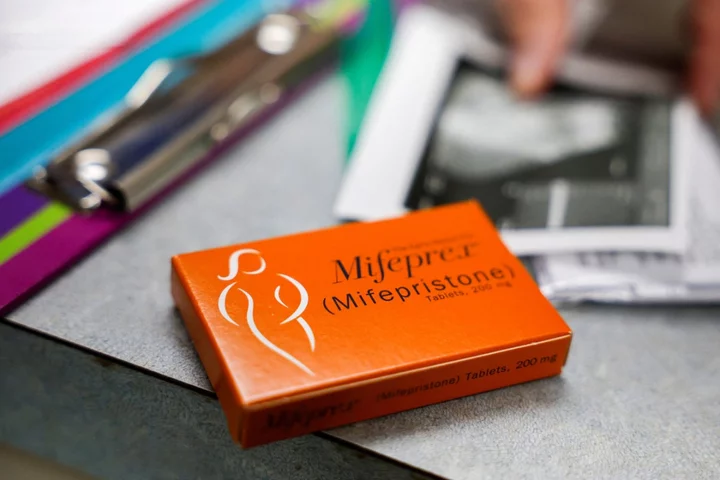
Abortion drug case likely headed to Supreme Court after Republican-appointed judges agree to restrict access
A high-stakes lawsuit over the future of a widely used abortion drug is likely heading to the US Supreme Court, set to determine the fate of abortion rights access across the country for a second time within two years. Three Republican-appointed judges on a federal appeals court have determined that the federal government did not follow proper procedures when it amended regulations for a commonly used medication abortion drug in 2016. But the restrictions will not immediately take effect. The panel partially upheld a ruling from a Donald Trump-appointed federal judge in Texas, whose sweeping decision earlier this year threatened to strip access to the drug altogether. Nothing in the ruling from a three-judge panel on 16 August will go into effect until the nation’s highest court weighs in. Wednesday’s ruling argues that the US Food and Drug Administration unlawfully expanded access to mifepristone, which was first approved by the federal government more than 20 years ago. Mifepristone was first approved by the FDA in 2000 and is approved for use up to 10 weeks of pregnancy. A vast majority of abortions occur within the first nine weeks of pregnancy. From 2019 through 2020, nearly 93 per cent of all abortions were performed before the 13th week, according to the US Centers for Disease Control and Prevention. The drug – part of a two-drug protocol for medication abortions, the most common form of abortion care in the US – is the subject of a lawsuit from a group of anti-abortion activists represented by right-wing Christian legal group Alliance Defending Freedom, which joined efforts to overturn Roe v Wade at the Supreme Court last year. In April, US District Judge Matthew Kacsmaryk – a former right-wing activist lawyer who was appointed to the federal judiciary by Mr Trump – issued a ruling to suspend the FDA’s approval, which was immediately challenged by abortion rights advocates, providers, major medical groups, drug manufacturers and President Joe Biden’s administration. An initial ruling at the US Court of Appeals for the Fifth Circuit blocked part of that decision but struck down policies for mail-in prescriptions and rules that expanded the drug’s approval for pregnancies up to 10 weeks. On 21 April, the Supreme Court blocked the lower courts’ rulings from taking effect while the case plays out, retaining the status quo while the legal case plays out. Following the Supreme Court’s conservative supermajority decision to revoke a constitutional right to abortion care in Dobbs v Jackson Women’s Health Organization, at least 15 states – mostly across the US South – have effectively banned most abortions and imposed criminal penalties against providers. Abortion rights advocates and providers have warned that eliminating or restricting access to mifepristone could drastically impact an already-fragile landscape for abortion care. A ruling that undermines the FDA’s drug approval process could also open the door for other activist-driven legal battles over other drugs wrapped up in political debates, potentially inviting other destabilising lawsuits to Covid-19 vaccines, contraception, HIV medication, gender-affirming care, and other life-saving drugs. Read More What is mifepristone? The widely used pill in the abortion rights battle at the Supreme Court Abortion rights advocates win major victory in Ohio as voters reject GOP plan to thwart ballot measure Texas women detailed agonising pregnancies after being denied abortions. The state blames doctors Some abortion drug restrictions upheld by in a case bound for Supreme Court Akram criticizes Pakistan Cricket Board for leaving Imran Khan out of Independence Day video Netanyahu voices support for Israel's military after his allies and son lambaste security officials
2023-08-17 04:19

Janet Yellen admits ‘enjoying’ hallucinogenic mushrooms on China visit
Treasury Secretary Janet Yellen confirmed on Monday that she unwittingly ate a dish containing hallucinogenic mushrooms at a restaurant during a visit to China last month. “So I went with this large group of people and the person who had arranged our dinner did the ordering. There was a delicious mushroom dish,” she said on Monday. “I was not aware that these mushrooms had hallucinogenic properties. I learned that later.” “I … read that if the mushrooms are cooked properly, which I’m sure they were, at this very good restaurant, that they have no impact,” she added. “But all of us enjoyed the mushrooms, the restaurant and none of us felt any ill effects from having eaten them.” During the Treasury official’s visit to China last month, she and her team stopped at a location of Yi Zuo Yi Wang, a restaurant chain specialising in dishes from the Yunnan province, where a food blogger on Weibo spotted the top official eating a variety of Chinese dishes. “When I walked by their table on my way to the washroom, I slowed down to take a glance at the dishes they ordered,” the blogger wrote. That included an order of potentially hallucinogenic jian shou qing mushrooms, a delicacy in Yunnan province. “Our staff said she loved mushrooms very much,” the restaurant wrote on social media. “She ordered four portions of jian shou qing (a Yunnan wild mushroom species). It was an extremely magical day.” The mushrooms are “considered poisonous as they can be hallucinogenic,” Dr Peter Mortimer, a professor at Kunming Institute of Botany who studies the region’s mushrooms, told CNN. “However, scientists have not, as of yet, identified the compounds responsible for causing the hallucinations,”he added. “It remains a bit of a mystery, and most evidence is anecdotal. I have a friend who mistakenly ate them and hallucinated for three days.” Chinese state media quoted diners praising Ms Yellen for her interest in Chinese cuisine and warning about the impacts of the mushrooms. “You thought you were walking straight but you just fell sideways,” one person who had eaten a similar dish told the Xinhua state news agency. The restaurant where the secretary ate was quickly flooded with reservations. "We received a larger number of inquiries about bookings. We are fully booked for Friday and Saturday," a staff member told the state-owned Global Times. Read More Biden signs order barring US investment in Chinese chips, quantum computing and AI sectors Treasury Secretary Janet Yellen reportedly ate hallucinogenic mushrooms at restaurant during China visit China's Xi tells Kissinger that China-US ties are at a crossroads and stability is still possible
2023-08-16 08:17
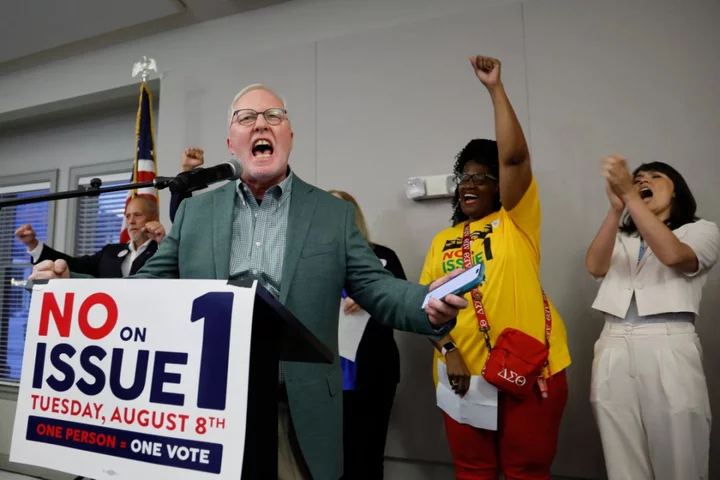
Ohio vote shows enduring power of abortion rights at ballot box, giving Democrats a path in 2024
Abortion wasn't technically on the ballot in Ohio's special election. But the overwhelming defeat of a measure that would have made it tougher to enshrine abortion rights in the state constitution this fall was the latest indicator that the issue remains a powerful force at the ballot box. The election saw heavy turnout for what's typically a sleepy summer election date and sets up another battle in November, when Ohio will be the only state this year to have reproductive rights on the ballot. It also gives hope to Democrats and other abortion rights supporters who say the matter could sway voters their way again in 2024. That's when it could affect races for president, Congress and statewide offices, and when places such as the battleground of Arizona may put abortion questions on their ballots as well. Democrats described the victory in Ohio, a one-time battleground state that has shifted markedly to the right, as a “major warning sign” for the GOP. “Republicans’ deeply unpopular war on women’s rights will cost them district after district, and we will remind voters of their toxic anti-abortion agenda every day until November,” said Aidan Johnson, a spokesperson for the Democratic Congressional Campaign Committee. The measure voters rejected Tuesday, known as Issue 1, would have required ballot questions to pass with 60% of the vote rather than a simple majority. Interest was unusually high, with millions spent on each side and voters casting more than double the number of early in-person and mail ballots ahead of the final day of voting as in a typical primary election. Early turnout was especially heavy in the Democratic-leaning counties surrounding Cleveland, Columbus and Cincinnati. Opposition to the measure, which became a kind of proxy for the November abortion vote, extended even into traditionally Republican areas. In early returns, support for the measure fell far short of Donald Trump’s performance during the 2020 election in nearly every county. The November ballot question will ask voters whether individuals should have the right to make their own reproductive health care decisions, including contraception, abortion, fertility treatment and miscarriage care. Ohio's GOP-led state government in 2019 approved a ban on abortion after cardiac activity is detected — around six weeks, before many women know they are pregnant — but the ban was not enforced because of the U.S. Supreme Court ruling in Roe v. Wade, which granted a federal right to the procedure. When a new conservative majority on the high court last year overturned the nearly 50-year-old ruling, sending authority over the procedure back to the states, Ohio's ban briefly went into effect. But a state court put the ban on hold again while a challenge alleging it violates the state constitution plays out. During the time the ban was in place, an Indiana doctor came forward to say she had performed an abortion on a 10-year-old rape victim from Ohio who could not legally have the procedure in her home state. The account became a national flashpoint in the debate over abortion rights and underscored the stakes in Ohio. Ohio is one of about half of U.S. states where citizens may bypass the Legislature and put ballot questions directly to voters, making it an option that supporters of reproductive rights have increasingly turned to since Roe v. Wade fell. After abortion rights supporters said they hoped to ask voters in November to enshrine the right in the state constitution, Ohio Republicans put Issue 1 on Tuesday’s ballot. In addition to raising the threshold to pass a measure, it would have required signatures to be collected in all 88 counties, rather than 44. The 60% threshold was no accident, abortion rights supporters say, and was aimed directly at defeating the Ohio abortion measure. Since Roe v. Wade was overturned, six states have had elections regarding reproductive rights. In every election — including in conservative states like Kansas — voters have supported abortion rights. In Kansas, 59% voted to preserve abortion rights protections, while in Michigan 57% favored an amendment that put protections in the state constitution. Last year, 59% of Ohio voters said abortion should generally be legal, according to AP VoteCast, a broad survey of the electorate. Last month, a poll by the Associated Press-NORC Center for Public Affairs Research found the majority of U.S. adults want abortion to be legal at least through the initial stages of pregnancy. The poll found that opinions on abortion remain complex, with most people believing abortion should be allowed in some circumstances and not in others. Opponents of the Ohio abortion question ran ads that suggested the measure could strip parents of their ability to make decisions about their child’s health care or to even be notified about it. Amy Natoce, spokesperson for the anti-abortion campaign Protect Women Ohio, called the ballot measure a “dangerous anti-parent amendment.” Several legal experts have said there is no language in the amendment supporting the ads’ claims. Peter Range, CEO of Ohio Right to Life, said he has been traveling across Ohio talking to people and “I’ve never seen the grassroots from the pro-life side more fired up to go and defend and protect the pre-born.” While the November question pertains strictly to Ohio, access to abortion there is pivotal to access across the Midwest, said Alison Dreith, director of strategic partnership for the abortion fund Midwest Access Coalition. Nine Midwestern states — Indiana, Iowa, Kansas, Ohio, Nebraska, Missouri, North Dakota, South Dakota and Wisconsin — are considered restrictive, very restrictive or most restrictive of abortion rights by the Guttmacher Institute, a research and policy organization that supports legal access to abortion. “Ohio in particular has always been a destination state for the states around it,” Dreith said. “If we don’t protect abortion access in Ohio, the options just continue to shrink for people seeking care in the Midwest.” Sri Thakkilapati, the executive director of the Cleveland-based nonprofit abortion clinic Preterm, said the effect of the Ohio vote will reverberate throughout the country. “When we restrict access in one state, other states have to take up that patient load,” she said. “That leads to longer wait times, more travel, higher costs for patients." Thakkilapati called the energy around abortion rights in last year's midterms “exciting.” But she said the media attention died down, and people quickly forgot “how tenuous abortion access is right now.” The special election and ballot measure in Ohio are “a reminder of what’s at stake," Thakkilapati said. “Other states are watching how this plays out in Ohio, and it may give anti-abortion groups in other states another strategy to threaten abortion rights elsewhere,” she said. “And for the majority who do want abortion access in their states but are seeing it threatened, the results in November could give them hope that the democratic process may give them relief.” Kimberly Inez McGuire, the executive director of Unite for Reproductive and Gender Equity, which focuses on young people of color under age 30, says the results of elections involving reproductive rights show that support doesn't come just from Democrats or in cities and states considered liberal bastions. “There was this idea that we couldn’t win on abortion in red states and that idea has really been smashed,” McGuire said. So, too, she said, is the “mythology” that people in the South and Midwest won't support abortion rights. “I think 2024 is going to be huge,” she said. “And I think in many ways, Ohio is a proving ground, an early fight in the lead up to 2024.” Dreith said that since abortion hasn't been on a major ballot since last year, the Ohio vote this fall is “a good reminder” for the rest of the country. “Abortion is always on the ballot — if not literally but figuratively through the politicians we elect to serve us,” she said. "It’s also a reminder that this issue isn’t going away.” Read More Ukraine war’s heaviest fight rages in east - follow live Charity boss speaks out over ‘traumatic’ encounter with royal aide Why Ohio's Issue 1 proposal failed, and how the AP called the race Ohio voters reject GOP plan to thwart upcoming abortion rights proposal Abortion rights advocates push for 2024 ballot initiative in Arizona
2023-08-09 23:50

Abortion rights advocates win major victory in Ohio as voters reject GOP plan to thwart ballot measure
Ohio voters have resoundingly rejected a measure that would make it more difficult to amend the state’s constitution, a proposal that Republican officials bluntly admitted was an effort to kneecap an upcoming ballot measure asking voters to enshrine a right to abortion care. That proposal has failed, with roughly 65 per cent of the vote tallied by Tuesday night after polls had closed, according to projections from the Associated Press. Issue 1 would have required that proposed amendments to the state constitution receive at least 60 per cent of the vote, raising the threshold substantially from a current simple majority vote. It also would have increased the minimum number of petition signatures that groups would have to collect before qualifying an issue to get on a ballot. The proposal’s failure means that a November referendum on abortion rights will need only 50 per cent of the vote to enshrine those protections into the state’s constitution, a major victory for abortion rights advocates and democratic campaigns in the aftermath of the US Supreme Court’s decision to strike down Roe v Wade. President Joe Biden called the measure a “blatant attempt to weaken voters’ voices and further erode the freedom of women to make their own health care decisions.” “Ohioans spoke loud and clear, and tonight democracy won,” he said in a statement. Within the last year, voters have also turned out in record numbers to protect abortion rights in California, Kansas, Michigan and Vermont, underscoring the overwhelming unpopularity of the Supreme Court’s decision and the volatile landscape for reproductive healthcare in its wake, while scrambling anti-abortion campaigns from Republican officials emboldened by the ruling. Issue 1 campaign Protect Our Constitution was largely supported by GOP mega-donor and Illinois businessman Richard Uihlein. A coalition of abortion right, civil rights and democratic advocacy groups joined a No On Issue 1 campaign. “Tonight was a major victory for democracy in Ohio,” the group said in a statement following projections of the measure’s defeat. “The majority still rules in Ohio, and the people’s power has been preserved – because Ohio voters showed up and overwhelmingly voted down Issue 1.” Ohio voters saw the proposal for “what it was: a deceptive power grab designed to silence their voices and diminish their voting power,” the group added. Kelly Hall, executive director of the Fairness Project, said the results mark an “incredibly profound and inspiring day for democracy”. “When faced with the choice of whether to allow politicians and special interests to consolidate power and strip voters of their rights, Ohioans fought back,” she said in a statement. “The defeat of Issue 1 should send a clear message to other extremist officials around the country that democracy will not die; people are ready to defend their rights against blatant attacks like Issue 1.” The upcoming proposal for a constitutional amendment in November will ask Ohio voters whether “every individual has a right to make and carry out one’s reproductive decisions.” After the Supreme Court’s ruling in Dobbs v Jackson Women’s Health Organization last June, Ohio lawmakers swiftly outlawed most abortion after roughly six weeks of pregnancy, a law that is currently suspended by a state court injunction but could be reinstated by the state Supreme Court. A vote to enshrine abortion rights in the state’s constitution would effectively overrule any such law. Abortion rights advocates and providers have warned that Ohio’s ban, which does not include exceptions for pregnancies from rape or incest, ignited a healthcare crisis that endangered patients and their families across the state, forcing people to seek care hundreds of miles out of state and navigate complicated legal and medical minefields while experiencing pregnancy complications. Ohio Republicans initially canceled August elections altogether, which have historically low turnout. But in May, they reversed that decision to put Issue 1 on the ballot – a decision that appears to have backfired for them. Nearly 600,000 Ohio voters cast their ballots early, with voters reporting busy polling locations across the state on election day. Read More Texas judge sides with women after harrowing testimony over anti-abortion law DeSantis won’t rule out national abortion ban but suggests there’s no ‘mileage’ left in Congress
2023-08-09 11:28

DeSantis won’t rule out national abortion ban but suggests there’s no ‘mileage’ left in Congress
Ron DeSantis has not ruled out enacting a national abortion “ban” if elected president, after the Florida governor implemented state restrictions on abortion access at 15 weeks and six weeks of pregnancy within the last two years. But he suggested that there is no “consensus” in the US for members of Congress to implement a national ban, as abortion restrictions and the US Supreme Court’s decision to overturn Roe v Wade remain overwhelmingly unpopular. Asked by NBC’s Dasha Burns whether he would “veto any sort of federal bill” that would institute a nationwide ban, Mr DeSantis replied: “We will be a pro-life president and we will support pro-life policies.” In the wake of the Supreme Court’s decision to revoke a constitutional right to abortion care last year, Republican officials have repeatedly stated that the ruling merely left it up to individual states to decide. But anti-abortion lawmakers at the state level and in Congress continue to push for national restrictions that would also strike down state laws that protect and expand abortion access. Congressional Republicans have already passed several anti-abortion measures with national implications and have signalled the GOP’s readiness to ban abortion at certain gestational limits. President Joe Biden has promised to veto any such legislation, if it made it through Congress. In media appearances throughout his campaign, the governor has not directly answered whether he would support or veto legislation that would enact national abortion restrictions, suggesting that the issue should come from the “bottom up” with individual states determining policy. His statements have drawn criticism from influential anti-abortion group Susan B Anthony Pro-Life America, which called the governor’s position “unacceptable” to anti-abortion voters. Meanwhile, his campaign’s top donor has threatened to stop funding the candidate over his “extreme” position on abortion. And Donald Trump, who has taken credit for the Supreme Court’s decision in Dobbs v Jackson Women’s Health Organization, has suggested that his rival for the 2024 Republican nomination for president has gone too far with a state law that bans abortion at six weeks of pregnancy, signed into law just one year after a 15-week limit was put in place. “Dobbs returned it to the political branches. I think the reality is that that basically means the states are going to have primary control over it,” Mr DeSantis told NBC. “You know, I do think the federal government would have an interest in, say, preventing post-birth abortions or things that are really horrific, but I don’t think that there’s enough consensus in the country to see a lot of mileage in Congress,” he added. There is no such thing as a “post-birth” abortion; killing an infant after birth is illegal in all states, and pregnancies resulting in the death of the fetus in the third trimester are exceedingly rare, and largely involve fetal anomalies and life-threatening medical emergencies. The vast majority of abortions take place within the first trimester, while roughly 1 per cent occur after 21 weeks, according to the US Centers for Disease Control and Prevention. The governor also suggested that Democratic officials support “infanticide”, echoing his remarks in a recent CNN interview claiming that “liberal state” allow “post-birth” abortion. “I would not allow what a lot of the left wants to do, which is to override pro-life protections throughout the country all the way up really to the moment of birth in some instances, which I think is infanticide,” he told NBC News. Ms Burns interrupted Mr DeSantis: “That’s a misrepresentation of what’s happening.” The governor also said that he does not support penalties for people who seek abortions. “Not at all,” he told Ms Burns. “No, I don’t think this is an issue about the woman. I think a lot of these women, you know, are in very difficult circumstances. They don’t get any support from a lot of the fathers. And a lot of them, the number one reason why women choose to have an abortion is because they’re not getting support and they feel abandoned. Now, in Florida we’ve provided support and we’ve put our money where our mouth is, but at the end of the day, you know, I would not support any penalties on a woman.” Mr DeSantis also told NBC that he does not support limits on contraception access. “And I think it should be available over-the-counter, and I think people should be able to have access to it,” he added. Read More Texas judge sides with women after harrowing testimony over anti-abortion law Alabama health care providers sue over threat of prosecution for abortion help ‘Walmart Melania’, ‘America’s Karen’ or ‘Tacky Onassis’: Why Casey DeSantis matters to the 2024 race Senator who once worked at a Planned Parenthood warns that Republicans are planning a national abortion ban
2023-08-08 00:47

Trump goes on kooky rant about how long it takes to wash his ‘gorgeous head of hair’
With a trio of indictments looming overhead, Donald Trump took time to assure his voters that he was focused on what really matters heading into 2024 — his shower's water pressure. During the keynote speech of a GOP dinner in South Carolina on Saturday, Mr Trump told the crowd that modern water pressures just weren't getting the job done. Though Mr Trump has proven in past speeches that he does not need segues — preferring instead to crash from topic to topic without regard for logic or causality — he did lead into his shower rant, sort of, by complaining about regulations. “You know I have this gorgeous head of hair – when I take a shower, I want water to pour down on me. When you go into these new homes with showers, the water drips down slowly, slowly,” Mr Trump told the diners. It is unclear where Mr Trump — whose two main domiciles are a luxury golf resort in Florida and a gilded skyscraper in Manhattan, both of which he owns — is experiencing these shower troubles. “You have suds, beautiful nice wonderful suds, a lot of money, Procter & Gamble, all that crap that they sell they say is good, probably costs ’em about two cents and they sell it for $10," Mr Trump said. "It takes you 10 minutes to wash your hair. You know what you do? You just stay in the shower about 10 times longer than you would have, it’s the same, you probably use more water. I broke all that up.” It's not the first time Mr Trump has complained about his bathroom activities being disrupted by water conservation efforts. In 2019 he made the telling-on-himself admission that Americans had to flush their toilets "10 times, 15 times, as opposed to once," blaming water regulating standards for his apparent need to flush a dozen times per use. “You turn on the faucet and you don’t get any water. They take a shower and water comes dripping out. Just dripping out, very quietly dripping out,” he said at the time. “People are flushing toilets 10 times, 15 times, as opposed to once.” The water issue was one of the few things Mr Trump did while in office that aligned with his early campaign promises; he directed the Department of Energy to ease up water conservation standards for showerheads. The former president may have changed the rules, but it didn't really change the way products were manufactured. Nearly all commercially available showerheads during his presidency adhered to the previous standards. Joe Biden reversed the measure following Mr Trump's presidency. Perhaps the most baffling element of Mr Trump's water gripes is his insistence that easing up regulations would actually save water. “[Americans] end up using more water. So [the] EPA is looking at that very strongly at my suggestion,” Mr Trump said in 2019. And later in 2019: “You go into a new building or a new house or a new home and they have standards only you don’t get water. You can’t wash your hands practically, there’s so little water comes out of the faucet. And the end result is you leave the faucet on and it takes you much longer to wash your hands,” Mr Trump said. He then told his supporters that his administration would be "looking at" the concept of "rain" and "opening that up." It is unclear what he was talking about, but here is what he said. “There may be some areas where we’ll go the other route – desert areas – but for the most part you have many states where they have so much water – it comes down, it’s called rain. They don’t know what to do with it,” he said, laughing at what presumably was a joke. “So we’re going to be looking at opening up that I believe. And we’re looking at changing the standards very soon.” Read More Trump attacks ‘delusional’ Pence over key role in election indictment: ‘Gone to the dark side’ Trump demands Judge Tanya Chutkan be removed from election case after ruling against him DoJ requests protective order after Trump threatens revenge in Truth Social post Trump attacks ‘delusional’ Pence over key role in election indictment Trump demands Judge Tanya Chutkan be removed from election case Vivek Ramaswamy's Hindu faith is front and center in his GOP presidential campaign
2023-08-07 00:58
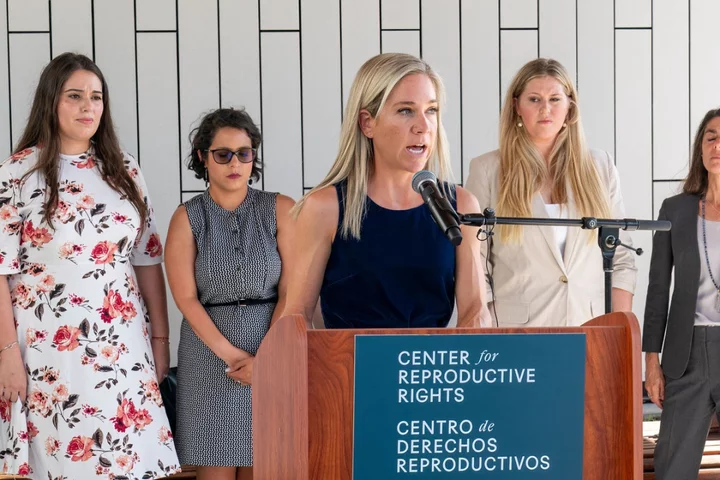
Texas judge sides with women after harrowing testimony over anti-abortion law
A Texas judge has sided with a group of women who were denied abortions in the state, putting their health and lives at risk during dangerous complications. The judge has temporarily blocked the state’s ban on abortions during medically complicated pregnancies in response to a lawsuit from 13 women seeking urgent clarity in the state’s anti-abortion law. An injunction from District judge Jessica Mangrum on 4 August follows harrowing courtroom testimony from five plaintiffs during a two-day hearing in which they were cross examined by attorneys for the state, which has sought to toss the case out altogether. The judge has also rejected that request. “For the first time in a long time, I cried for joy when I heard the news,” lead plaintiff Amanda Zurawski said in a statement from the Center for Reproductive Rights, which is representing the women in the case. “This is exactly why we did this. This is why we put ourselves through the pain and the trauma over and over again to share our experiences and the harms caused by these awful laws,” she added. “I have a sense of relief, a sense of hope, and a weight has been lifted. Now people don’t have to be pregnant and scared in Texas anymore. We’re back to relying on doctors and not politicians to help us make the best medical decisions for our bodies and our lives.” Texas outlaws most abortions except for conditions that qualify as “medical emergencies,” sparking widespread confusion among providers and hospitals fearing legal blowback or severe criminal penalties. Healthcare providers in the state found in violation of those laws could lose their medical license, face tens of thousands of dollars in fines, or prison. The lawsuit asked the court to help provide clarity around what circumstances qualify as exceptions, allowing doctors to use their own medical judgment without fear of prosecution. In her ruling, Judge Jessica Mangrum wrote that doctors cannot be prosecuted for using their own “good faith judgment” in providing such care, and that “physical medical conditions include, at a minimum: a physical medical condition or complication of pregnancy that poses a risk of infection, or otherwise makes continuing a pregnancy unsafe for the pregnant person; a physical medical condition that is exacerbated by pregnancy, cannot be effectively treated during pregnancy, or requires recurrent invasive intervention; and/or a fetal condition where the fetus is unlikely to survive the pregnancy and sustain life after birth.” The injunction will be temporarily blocked if and when the state appeals the decision. “This makes me hopeful that we can continue to provide competent rational care,” said Dr Damla Karsan, who is among two obstetrician-gynecologists who joined 13 other Texas women in the case. “It’s exactly what we needed,” she added. “The court has guaranteed that we can once again provide the best care without fear of criminal or professional retribution. We can once again rely on our knowledge and training especially in challenging situations where abortions are necessary.” More than a dozen states, largely across the US South, have effectively outlawed abortions in the aftermath of the US Supreme Court decision to revoke a constitutional right to abortion care. The decision to overturn Roe v Wade and ensuing anti-abortion laws have upended access to care for millions of Americans who are forced to travel outside their states where abortion is protected, compounding the already-fractured and patchwork system for abortion care across the country. Anti-abortion laws in Texas have “paralyzed” health providers from being able to properly counsel and advise their patients, Dr Austin Dennard testified during the Texas abortion lawsuit hearing. “We’re truly doing the best that we can with the situation that has been given to us,” she said. Read More Texas women detailed agonising pregnancies after being denied abortions. The state blames doctors Texas women suing over anti-abortion law give heartbreaking testimony in landmark case. The stress causes one to vomit on the stand Texas man who threatened poll workers and Arizona officials is sentenced to 3 1/2 years Colorado fugitive who was captured in Florida was leading a posh lifestyle and flaunting his wealth A cyberattack has disrupted hospitals and health care in several states
2023-08-05 12:15

Ron DeSantis mocked for dismal turnout at campaign event offering $1 beer
Ron DeSantis drew only a few dozen people to a $1 beer campaign event in New Hampshire, according to local reports. The event, held Saturday in Concord, initially drew approximately two dozen people, according to NBC News. The original price for the event — which allows voters to drink a beer with Mr DeSantis — was set at $50, but was later slashed to $1 in order to bolster turnout. The event reportedly started a half-hour late, and only 30 people were in attendance. Discussing the event on MSNBC, reporter Jonathan Allen quipped that "maybe [Mr DeSantis's campaign] should have offered something harder ... maybe half a bottle of liquor or something." He also noted that Mr DeSantis later attended a house party, which only drew about 35 attendees. Allen said that the governor's last few campaign trips have failed to draw many supporters and has resulted in numerous viral clips of the candidate looking awkward while engaging with voters. "So, he spent four days in New Hampshire, he had a couple of good events with slightly larger crowds, but maybe he met 2- or 300 people over the course of four days, which is wasted campaign time at this point in a presidential primary," Allen said. "It also says this comes on the back end of a two-day bus tour of Iowa, where we saw images and recordings of DeSantis struggling to talk with voters, to connect with them, asking a child at one point about the sugar content of his Icee." In the "Icee" incident, Mr DeSantis notes that a child is holding a frozen drink from a local store, and seems to suggest its not a healthy choice. "Oh what is that? An Icee?" he asks. "That's probably a lot of sugar, huh?" Later the same night, an 82-year-old farmer told the governor that he can't work the same acreage he used to since his wife died from cancer, and asked about his thoughts on ethanol as a renewable fuel for cars. Instead of taking the chance to offer the farmer sympathy for his struggles, Mr DeSantis launched into prepared comments about stemming "this rush to electric vehicles." Despite these incidents, Mr DeSantis's team has insisted that he is not struggling to connect with voters, painting the critical coverage as organised media hit jobs trying to undermine the governor. "The media will continue their obsession with endless clickbait stories that do nothing to inform voters, and Ron DeSantis will keep sharing his plans to declare American's economic independence and restore sanity in our country as the next president," Andrew Romeo, Mr DeSantis's campaign spokesman, said. Mr Romeo said that though "some candidates think they are entitled to the nomination, the governor will not be outworked and will fight for every vote, one day at a time." Read More DeSantis wants Kamala Harris to meet the controversial right-wing scholar behind Florida’s slavery curriculum DeSantis-controlled Disney World district abolishes diversity, equity initiatives DeSantis ducks opportunity to attack Trump’s massive campaign spending on legal fees Ron DeSantis mocked for dismal turnout at campaign event offering $1 beer Matt Gaetz calls DeSantis ‘thirsty’ for Kamala Harris invite DeSantis calls new Trump indictment ‘unfair’ - while pushing his own campaign
2023-08-02 18:19

Ilhan Omar supports woman jailed for taking abortion pill and burning foetus: ‘A violation of autonomy’
Ilhan Omar has spoken out in defence of a teenage girl who was jailed for 90 days after taking an abortion pill to end an unwanted pregnancy. The Democratic congresswoman posted an image on Instagram of an article titled: “Nebraska teen who used pills to end pregnancy gets 90 days in jail”. “This is a freighting violation of privacy and autonomy…” Ms Omar wrote. Celeste Burgess, 19, was sentenced last week after she and her mother Jessica Burgess, 42, pleaded guilty to charges earlier this year. Prosecutors said Celeste Burgess used abortion pills well beyond the 10-week limit approved by the Food and Drug Administration. Court records reveal that she terminated her pregnancy when she was nearly 30 weeks pregnant, surpassing the generally recognised point of viability at 23 to 24 weeks. At that stage, a foetus would have a higher chance of survival outside the womb. The mother and daughter were charged after their private Facebook messages were obtained by the police. These messages revealed their plans to end Celeste’s pregnancy by using abortion pills ordered online and then “burn the evidence”. The teenager was not charged by prosecutors under Nebraska’s abortion law. Prosecutors agreed to drop two charges of concealing a death and false reporting against her after she pleaded guilty in May to concealing human skeletal remains. Celeste was also sentenced to two years probation apart from her 90 days’ jail sentence. Joseph Smith, the top prosecutor in Madison County, Nebraska, said the sentence “seems reasonable” as the teenager has no criminal history. “It’s a painful case for everybody,” he said, adding that it was the first case of its type that he had prosecuted in his 33-years-long career “and I’m glad it’s over”. Jessica Burgess meanwhile faces up to five years in jail. The case has prompted widespread discusson, wth Ms Omar the latest to comment on the case. Her post had garnered more than 68,000 likes as of early Tuesday morning, with comments fom her supporters including that the case was “like the beginning of the Handmaid’s Tale”. Read More Teen who took abortion pill to end pregnancy given 90 days in jail Texas women detailed agonising pregnancies after being denied abortions. The state blames doctors After Roe v Wade fell, this father-daughter duo left Texas to go on providing abortions AOC and other progressives to boycott Israeli president’s joint address to Congress Israel's president will meet with Biden as concerns over settlements, judicial overhaul continue Thai Parliament postpones vote to select new prime minister pending court ruling
2023-07-25 19:56
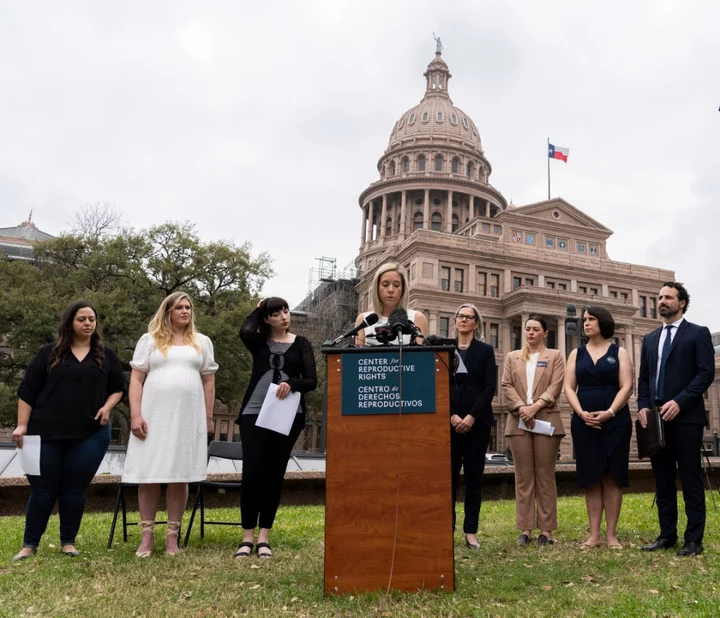
Texas women suing over anti-abortion law give historic and heartbreaking testimony in a landmark court case
In March, unable to legally obtain abortion care in Texas, Samantha Casiano was forced to carry a nonviable pregnancy to term, and gave birth to a three-pound baby who died hours later. Ms Casiano is among 13 women denied emergency abortion care under state law who are suing the state in a landmark case that is now in front of a Texas judge. In harrowing, historic courtroom testimony in Austin on 19 July, Ms Casiano and two other plaintiffs described their agony, isolation and heartbreak as they detailed their traumatic, life-threatening pregnancies and the state’s failure to care for them. As she described her experience to the court through tears, Ms Casiano vomited from the witness stand. “I watched my baby suffer for four hours,” she said in her testimony. “I am so sorry I couldn’t release you to heaven sooner. There was no mercy for her.” Abortion rights legal advocacy group Center for Reproductive Rights Texas filed the lawsuit on behalf of the women in March to force Texas authorities to clarify emergency medical exceptions to the state’s overlapping anti-abortion laws, marking the first-ever case brought by pregnant patients against such laws. Their testimony has underscored the depth of impacts from Texas laws and similar anti-abortion laws across the country, with abortion access stripped away for millions of Americans who are now exposed to dangerous legal and medical minefields during their pregnancies. The conflicting exemptions for medical emergencies in Texas have resulted in widespread confusion among providers and hospitals fearing legal blowback or severe criminal penalties, according to abortion rights advocates. Healthcare providers in the state found in violation of those laws could lose their medical license, face tens of thousands of dollars in fines, or receive a sentence of life in prison. The plaintiffs “suffered unimaginable tragedy” directly because of the state’s anti-abortion laws, Center for Reproductive Rights attorney Molly Duane said in her opening arguments. Texas officials and the state’s medical board have “done nothing” to clarify the law, she said. “I feel like my hands are tied,” said Houston obstetrician-gynecologist Dr Damla Karsa. “I have the skill, training and experience to provide care but I’m unable to do so. It’s gut-wrenching. I am looking for clarity, for a promise that I’m not going to be prosecuted for providing care.” Attorneys for the state have sought to dismiss the case altogether, arguing in court filings that the women lack standing to challenge the law because it is ultimately uncertain they will face similar complications again, that their “alleged prospective injuries are purely hypothetical”, and that some of the plaintiffs admitted they have since “struggled to become pregnant” again after their traumatic experiences. Amanda Zurawski, the lead plaintiff in the case, is still hoping to become pregnant after her life-threatening pregnancy. She called the state’s argument “infuriating and disgusting and ironic.” “Do they not realise the reason why I might not be able to get pregnant again is because of what happened to me as a result of the laws that they support?” she told the court. “Anybody who’s been through infertility will tell you it is the most isolating, grueling, lonely, difficult thing a person can go through.” ‘I wished I was dreaming. I knew I wasn’t’ Ms Casiano, a mother of four, was hoping for a girl. When she visited her physician for a checkup last September, “all of a sudden the room went cold” and quiet, she testified. Her daughter was diagnosed with anencephaly, a fatal birth defect in which a baby is born without parts of a brain or skull. “My first thought was … ‘maybe it’s a surgery, maybe she can be fixed,’ and then she said, ‘I’m sorry, but your daughter is incompatible with life, and she will pass away before or after birth,’” Ms Casiano said. “I felt cold,” she said. “I was hurt. I wished I was dreaming. I knew I wasn’t. I just felt lost.” A case worker at her obstetrician’s office gave her a pamphlet with funeral homes. She was prescribed antidepressants. She could not be referred for abortion care anywhere in the state. Texas was the first to implement a near-total ban on abortion, months before the US Supreme Court struck down the constitutional right to abortion last June, a decision that triggered a wave of state laws and legislation from anti-abortion lawmakers and governors to restrict care and threaten providers with criminal penalties. Amanda Zurawski endured several rounds of fertility treatments, tests, surgeries and misdiagnoses before learning she was pregnant in May of last year. “We were at first in shock … we were over-the-moon excited,” Ms Zurawski said. But her obstetrician discovered that she dilated prematurely, and soon after her membranes ruptured, draining amniotic fluid and endangering the life of her expected child. Doctors informed her there was nothing they could do under what was recently enacted state law, despite knowing with “complete certainty we were going to lose our daughter,” she said. The condition led to life-threatening sepsis. Doctors ultimately induced labor. Her daughter, which she named Willow, was not alive when she delivered. Ms Zurawski and her husband are still trying for pregnancy, but the trauma has closed one of her fallopian tubes, and a doctor had to surgically reconstruct her uterus. They also are considering in vitro fertilization, surrogacy and adoption. She previously testified to members of Congress about her experience, a story she will continue to tell, even if it is “excruciating” to do so, she told the Texas courtroom. “I know that what happened to me is happening to people all over the country. … So many people are being hurt by similarly restrictive bans,” she said. She has spoken out “because I can, and I know a lot of people who are experiencing or will experience something similar who can’t speak out, and it’s for those people I will,” she said. Healthcare providers caring for pregnant patients in the months after the Supreme Court’s decision to overturn Roe v Wade have faced severe obstacles for providing standard medical care in states where abortion is effectively outlawed, leading to delays and worsening and dangerous health outcomes for patients, according to a first-of-its-kind report released earlier this year. Individual reports from patients and providers like those named in the Texas lawsuit have shed some light on the wide range of harm facing pregnant women in states where access to abortion care is restricted or outright banned. But reporting from the University of California San Francisco captures examples from across the country, painting a “stark picture of how the fall of Roe is impacting healthcare in states that restrict abortion,” according to the report’s author Dr Daniel Grossman. More than a dozen states, mostly in the South, have effectively outlawed or severely restricted access to abortion care after the Supreme Court’s decision in Dobbs v Jackson Women’s Health Organization last June. The decision has also opened new legal challenges, ones that could once again reshape the future of abortion access in America, while anti-abortion lawmakers and Republican candidates face a public that is overwhelmingly against such bans. ‘I don’t feel safe to have children in Texas anymore’ Ashley Brandt sent a picture of an ultrasound to her husband when she found out she was pregnant with twins. But after her 12-week ultrasound last May, doctors discovered one of the twins had acrania, in which the skull of the fetus is not formed, and brain tissue is exposed to amniotic fluid. The condition is fatal. Despite no chance of the twin’s survival, Ms Brandt was not eligible under Texas law for a procedure called a selective fetal reduction; Twin A still had some signs of life, like muscle spasms and cardiac activity. They traveled to neighbouring Colorado for care, and she returned home the day after the procedure. She gave birth to her daughter in November. “If I had not gone out of state and just done what was legal in Texas, my daughter … would likely have been in the [neonatal intensive care unit],” she said. “All of my ultrasounds leading up to labor I would have had to watch twin A … deteriorate more and more, every ultrasound. … I would have to give birth to an identical version of my daughter without a skull, without a brain, and I would have to hold her until she died, and I would have to sign a death certificate, and hold a funeral.” She said the state has failed to account for medical emergencies like hers. “I don’t feel safe to have children in Texas anymore,” she said. “It was very clear that my health didn’t really matter, that my daughter’s health didn’t really matter.” Read More ‘I felt I couldn’t tell anyone’: The stigma of abortion keeps women silent. It’s time for us to shout Ohio voters are likely to decide the future of abortion rights One year after Roe v Wade fell, anti-abortion laws threaten millions. The battle for access is far from over
2023-07-20 08:50
